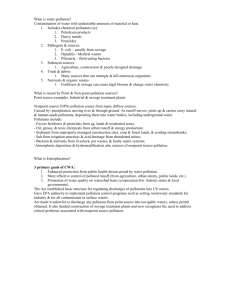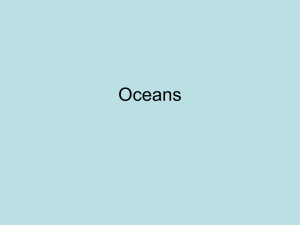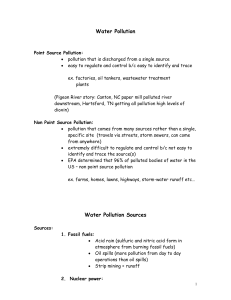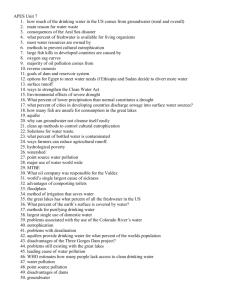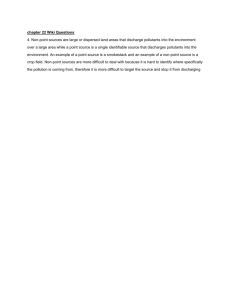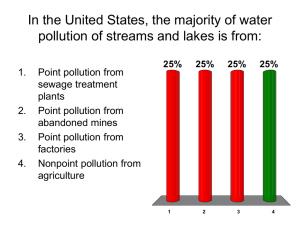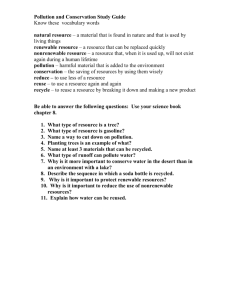Version A Name Date Water Pollution
advertisement
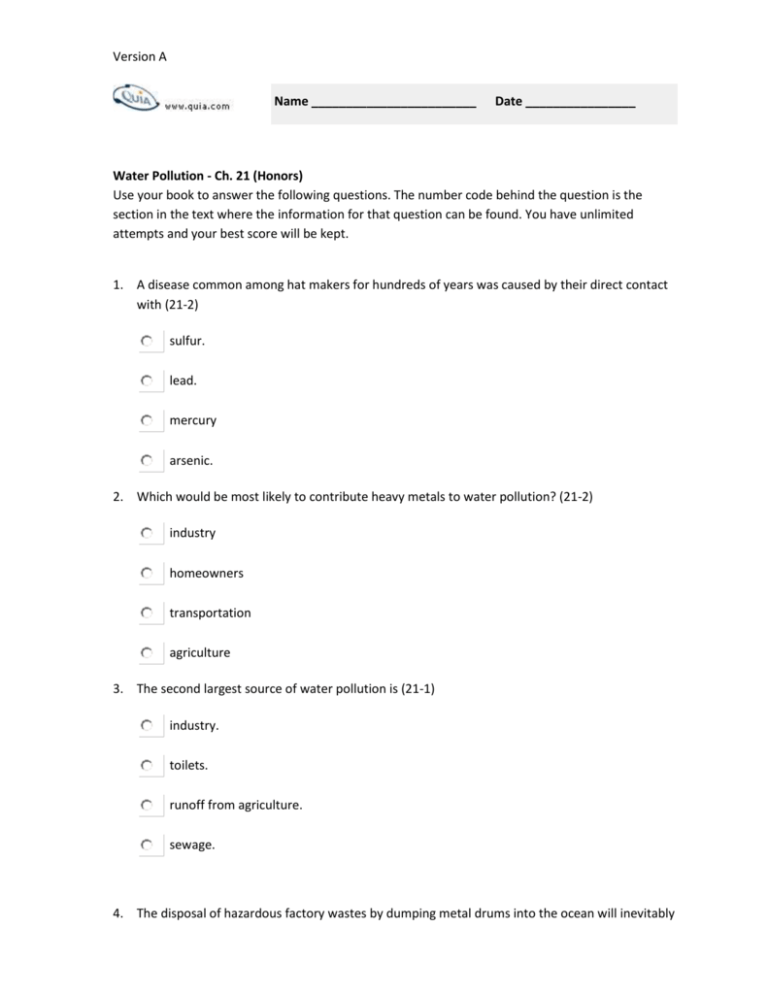
Version A Name ________________________ Date ________________ Water Pollution - Ch. 21 (Honors) Use your book to answer the following questions. The number code behind the question is the section in the text where the information for that question can be found. You have unlimited attempts and your best score will be kept. 1. A disease common among hat makers for hundreds of years was caused by their direct contact with (21-2) sulfur. lead. mercury arsenic. 2. Which would be most likely to contribute heavy metals to water pollution? (21-2) industry homeowners transportation agriculture 3. The second largest source of water pollution is (21-1) industry. toilets. runoff from agriculture. sewage. 4. The disposal of hazardous factory wastes by dumping metal drums into the ocean will inevitably contaminate the environment because (21-2) salt water corrodes metal. metal drums in increase the toxicity. wave action will crakc the drums. plankton corrode metal. 5. Which of the following is a toxic organic pollutant? (21-2) cadmium mercury hydrochloric acid crude oil 6. Which of the following is NOT a disease contracted through contaminated water? (21-1) schistosomiasis typhoid malaria cholera 7. Sediments enter water as pollutants from all of the following EXCEPT mining runoff. agriculture. urban runoff. industry. 8. The process of purifying raw sewage is known as (21-1) chlorination. secondary treatment. filtering. sewage treatment. 9. Any organisms that causes a disease is called a (21-1) bacterium. pathogen. microorganism. virus. 10. Water pollution from runoff comes mainly from 21-1) sewers. agriculture. ocean dumping. industry. 11. Which scientist proposed a link between contaminated water and cholera? (21-2) Koch Curie Salk Pasteur 12. Ozone is used in water purification because it...? (20-3) generates heat aerates water kills microorganisms is inexpensive 13. Thermal pollution kills fish primarily because (21-3) All fish need cool water. Fish have a high metabolism. Fish swim too close to the pipes. Warm water holds less oxygen. 14. The first Clean Water Act of 1972 was significant because it (21-4) guaranteed clean drinking water. standardized water quality for all states. enforced fines for oil spills. mandated the cleanup of Lake Erie. 15. A state may have few restrictions on water pollution in order to (21-4) improve mavigation. decrease unwanted fish populations. attract industry. encourage municipal responsibility. 16. The major cause of water pollution by industries involves (21-1) nutrients. sediments. toxic chemicals. pathogens. 17. The disaster in Minamata, Japan where people contracted mercury poisoning, is an example of which type of water pollution? (21-2) heavy metals sewage agricultural run-off organic chemicals 18. Which of the steps listed below is NOT a step in the treatment of sewage? (21-1) Sludge settles out in large tanks. Chlorine or other chemicals sterilze the water. Sludge is scaled in tanks and removed to the deep ocean. Screening of metals, plastics and other objects. 19. Eutrophication results from oxygen use by what organisms? (21-2) algae fish plants decompossers of algae 20. Agriculture contributes all of the following to water pollution EXCEPT (21-1) fungicides. animal wastes. pathogens. pesticides. 21. Marine animals are harmed not only by toxic chemicals but also by (21-4) lack of eutrophication. sewage treatment runoff. discarded plastic nets and fishing lines. frequent shipwrecks. 22. Which of the following is potentially a pathogen? (21-1) chlorine a virus toxic chemicals acid rain 23. Freezing is one method of? (20-3) reverse osmosis desalination sewage treatment distillation 24. If a person has malaria, it means he or she (21-1) has a very low hemoglobin count. was bitten by an infected mosquito. swam in water polluted with toxins. drank water polluted with toxins. 25. The common feature of all organic pollutants is that they (21-2) are naturally occurring. contain petroleum. cause brain damage. contain carbon. 26. Organic water pollutants include all of the following except (21-2) pesticides. heavy metals. petroleum. fertilizers. 27. The settling process in water purification plants is aided by the addition of...? (20-3) oxygen screens coagulants suspensions 28. The Clean Water Act does not ensure high water quality throughout the nation because it does not (21-4) address interstate navigation. apply to all states. have a means of enforcement. address drinking water. 29. Water pollution due to organic materials such as nitrates may result in (21-2) increased sedimentation. seepage. eutrophication. radioactive emissions.
